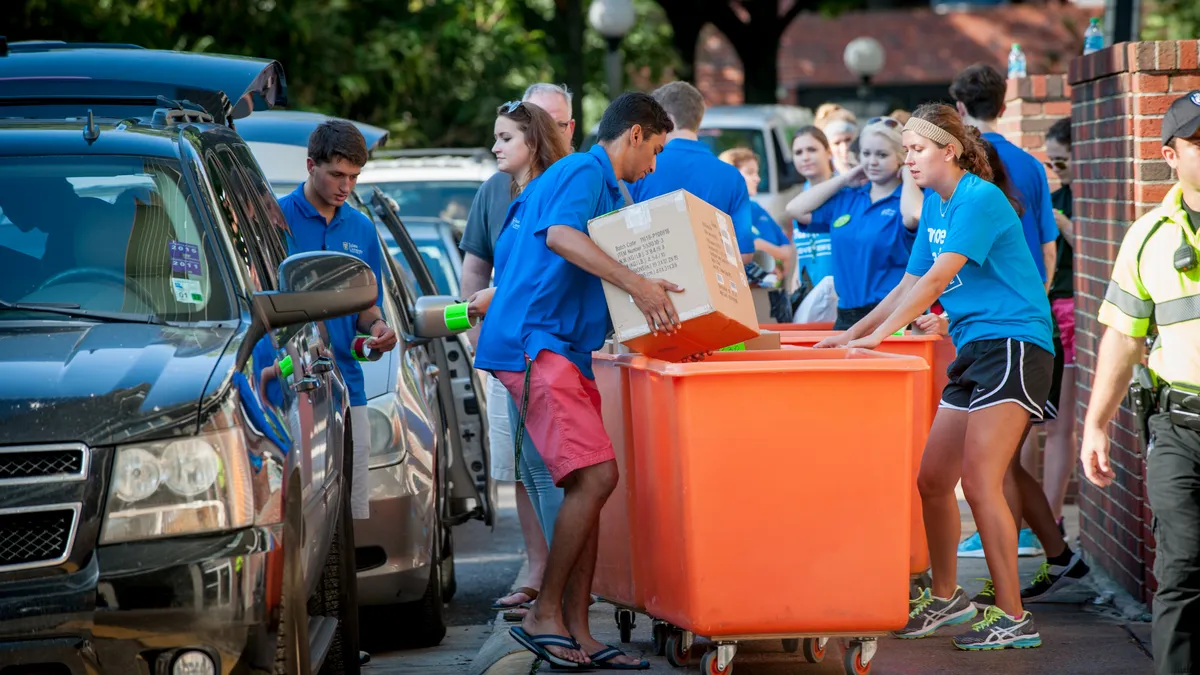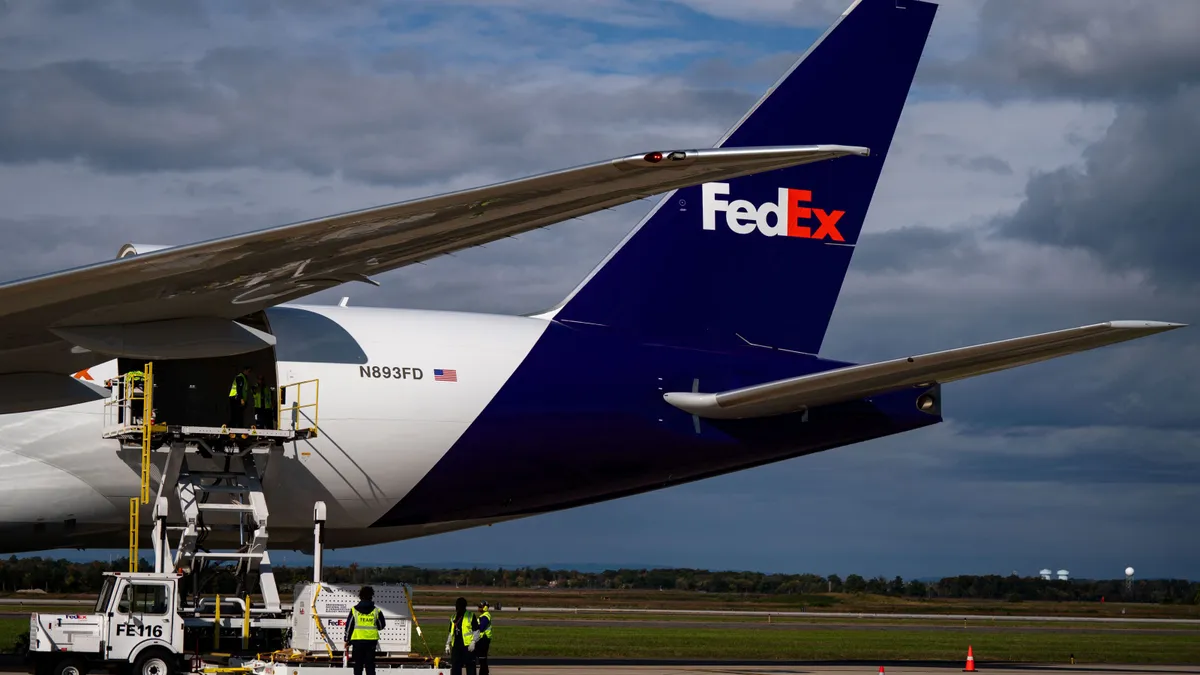When almost 2,000 freshmen showed up at Tulane on Aug. 21, their shipped boxes were already in their rooms. Students pulled up to the dorm at their appointed times, and volunteer "krewe" whisked everything out of the car, transporting belongings in laundry carts to the dorm rooms, while parents moved the cars and students got their ID cards and keys.
Does this sound like a typical dorm move-in? It is now.
For the past 18 years, the New Orleans university allowed freshmen to ship boxes to school ahead of arrival, as 90% of its students travel more than 500 miles to get there, Brian Johnson, Tulane’s assistant vice president of housing, told Supply Chain Dive. Boxes used to be sorted and stored in 53-foot tractor trailers on campus to be claimed on move-in day.
But no longer. After successful pilots the last few years, Tulane paid a contractor to sort, store and move shipped boxes into all freshman dorms, freeing up elevator use and lowering parent and student stress levels on what Tulane hopes is an easy and happy first day of college.
"When my kids went to college, move-in was the worst experience I ever had," said Vin Peseski, president and co-owner of University and Student Services (USS), Tulane’s contractor for this service. "Here I am, sweaty, cars abandoned, stuff on the street," he told Supply Chain Dive. Moving his son into Arizona State University (ASU) in 2002 made him wonder why there wasn’t a better way. He left his corporate sales job to sell what he calls a "cruise-ship move-in service," where student belongings go from the car to the dorm room without the family’s involvement. ASU signed on as a client in 2009, USS’ second year in business.
About 60 campuses now use USS moving services, with another 40 renting equipment like luggage carts, so the schools don’t have to buy and store them.
But Peseski said Tulane is the first school not charging freshmen for the cost to deliver shipped boxes to the room as part of the move-in experience, and other schools are watching with interest.
From home to dorm
Tulane’s 1,700-square-foot mailroom is not equipped to handle the thousands of oversized boxes arriving each August. Most are 20"x20"x20" or larger. Tulane uses its own off-site warehouse to receive and sort boxes for move-in, plus USS’ rented warehouse. Tulane gave incoming freshmen a special address for a two-week arrival window starting Aug. 1.
"We’re trying to get as much into the dorm delivery stream as we can," J. Malbrough, Tulane’s director of mail services, told Supply Chain Dive. The university encouraged parents to ship via FedEx Ground, and these packages were delivered directly to USS’ rented off-campus warehouse. During the first few days of the two-week window, 250 packages arrived daily from FedEx to the USS warehouse, and up to 200 packages daily from the other carriers. Malbrough expects Tulane will receive up to 500 packages per day toward the end of the window.
Students may get an email from USS when their FedEx package is delivered, sometimes with photos of the dorm room number and packages sitting on the bed.
Malbrough wanted to change to a system like this for years. Move-in package volume was growing. Trailer storage couldn’t be maximized because the trailers needed aisles. And the elevators were clogged with boxes, slowing down the move-in process. "Where is the most storage space on campus? The answer is in each dorm room," Malbrough said.
Other schools are seeing the benefits of a smoother move-in process. USS has grown by $1 million in revenue annually for the past six years, Peseski said. At ASU, his company moves in 8,000 students in 16 hours. "It’s one [student] every eight seconds, spread out across campus," he said. After hired staff unload the car and the parent parks, everything is in the room waiting for them.
The cost of move-in logistics
College needs and budgets vary. For a cruise-ship move-in service, USS charges $75-$110 per student, where families show up and the student’s belongings are whisked to the dorm room. "It’s not cheap," Peseski said. That fee includes labor and managing the entire move, from building the move-in plan to managing the traffic.
Hiring short term labor is a big part of the expense. USS hired 4,300 laborers during August and September last year. The temporary hires all need background checks, adding $2-3 an hour for labor fees when using an employment agency. That’s because contracted universities allow USS staff into the rooms without a chaperone, plus they’re around students and parents. Project managers start recruiting three to four months out. USS hired 500 laborers for ASU move-in, bussing some of them in from New Mexico and California for two to three days of work. A tight or expensive labor market in a specific university area may cause USS to turn a school down, as Peseski did with a Midwestern and a San Francisco university.
USS pays its temporary help in the $20s per hour, sometimes hiring student high school or college groups. In Chicago, the company recruits from the Navy base. USS uses hiring agencies as well. In addition to the background check, the project managers have to ensure the hires act appropriately. Peseski said he has a zero-tolerance policy because "the parents and students are everything. When we’re on campus, we’re no longer an independent business. We are part of the university." If a manager doesn’t like how a worker looks at a female student, for example, the worker is dismissed immediately. Peseski prefers that temporary labor doesn’t even talk to the families.
"Going to college for the first time is a monumental opportunity. It can be a really positive memory or jammed up with logistical issues."

Brian Johnson
Assistant VP of Housing, Tulane University
While labor is a big part of the equation, USS runs through a list of questions when deciding whether to accept a school’s business. How many beds does the school have? How many freshmen are moving in (schools predominantly hire USS to move in freshmen)? How many residence halls are covered? When are the move-in dates? If the calendar already has too many schools scheduled in that time period, USS turns them away.
When negotiating with a company like USS, schools customize their services. Not all schools can afford to pay for a cruise-ship move-in or box delivery. Parents at Louisiana State University (LSU) can contract directly with USS. "They pick a time, get a slot and the crew is waiting at the curb," Peseski said. As move-in day is often hot, "our walk-up business is through the roof." University of Arizona students contract directly with USS for dorm delivery, paying $49 plus shipping to deliver each box to the dorm room, the same service that Tulane covers for its students.
Tulane uses volunteers for move-in day, paying a flat fee to USS, around $120,000, to receive, sort, store and then deliver packages to the freshman dorms. That’s about double what the university paid FedEx Office to sort and store packages in the trucks in previous years. With that model, ROTC students moved the boxes into the dorms on move-in day, as a fundraiser.
"It’s not inexpensive, but from a housing perspective, it’s the cost of doing business," Johnson said. "Going to college for the first time is a monumental opportunity. It can be a really positive memory or jammed up with logistical issues." Smoothing out the move-in process also means getting cars off the street and being a good neighbor to the New Orleans community.
The logistics of handling dorm packages doesn’t suddenly stop after move-in day. Package volume remains elevated the first five weeks of the school year, as students order things they still need after settling in. Package delivery has increased 15% annually for the past three or four years, with 30% of Tulane’s packages coming from Amazon. Tulane is building a new mail facility this year, and Amazon is building another New Orleans facility to double its capacity, said Malbrough. As part of the new mailroom, Amazon is installing 300 intelligent package lockers on campus, and Tulane will install 500 of its own, with room for more.
With the growth in online retail, "we’re seeing the effects of that on the delivery of goods," said Johnson. "The days of rolling up with your stuff with this generation and future generations is changing. People are changing their tune for what they need and how they get things."





















